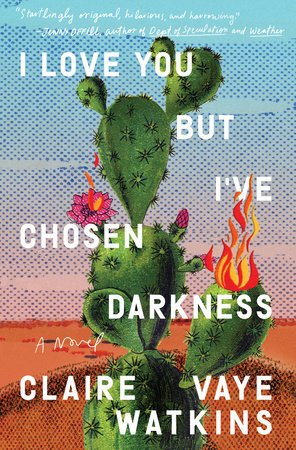I Love You But I’ve Chosen Darkness
Claire Vaye Watkins
Reviewed by Eden Shulman
For the witty, scathing narrator of Claire Vaye Watkins’ second novel, I Love You But I’ve Chosen Darkness, motherhood is a cage. Following her child’s first winter, a “sludgy era of despair, bewilderment, and rage,” an acclaimed writer, also named Claire Vaye Watkins, travels to her home state of Nevada for a doomed lecture at a local high school. While the trip was meant to be short, Claire decides to stay, leaving her infant daughter and husband back in Michigan.
As Claire impulsively travels from place to place, the novel investigates the lives of the people she’s lost: Her father, a former member of the Manson family turned witness for the prosecution; her mother, a troubled addict whose influence floats over Claire’s life like a storm cloud (and whose letters to a cousin form a significant part of the narrative); and an ex-boyfriend, Jesse, whose early death remains a continued source of regret. As the months go on, the pull of the daughter Claire left behind becomes more difficult for her to resist, despite all the memories keeping her in Nevada.
What ties these threads together is Watkins’ inimitable and acerbic voice, which spares no one its cutting judgment. The prose is associative and angry, and yet the novel’s prevailing modes are ambivalence and self-awareness, making for an exciting contrast. I Love You But I’ve Chosen Darkness leaves no stone of Claire’s life unturned, even (and especially) the embarrassing, revealing details. This is not a narrator afraid of seeming like a bad person, though the reader is always aware of the various traumas, grievances, and memories that shape her decisions.
The ex-boyfriend Jesse, however, is the heart of the novel. In one of the book’s saddest, plainest sentences, Watkins writes, “I am a dumb lump scratching my head, baffled by this most basic, ultimate fact: he was there then he was not.” Later, she comments on her own description of Jesse’s death, saying, “I am not doing a good job of this,” a statement I absolutely disagree with.
Simultaneously hilarious, heartbreaking, and raw, the novel highlights Watkins’ immense talent as a prose stylist and is a riveting addition to the canon of autofiction. Though often dense with information, I Love You But I’ve Chosen Darkness demonstrates the beauty that can be drawn from unsparing detail and small, painful moments: the stories you’d never want to tell.

